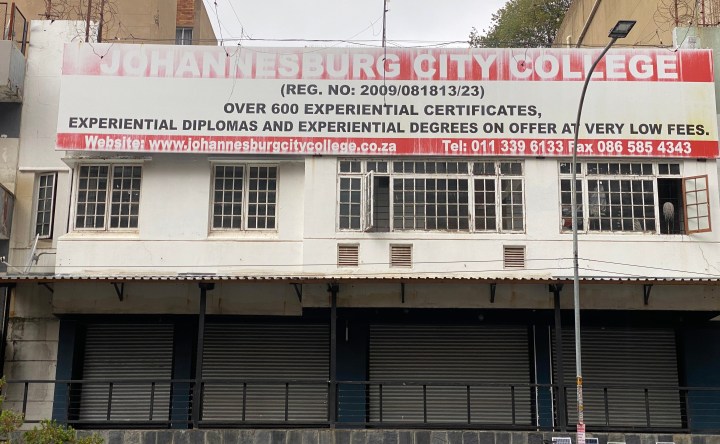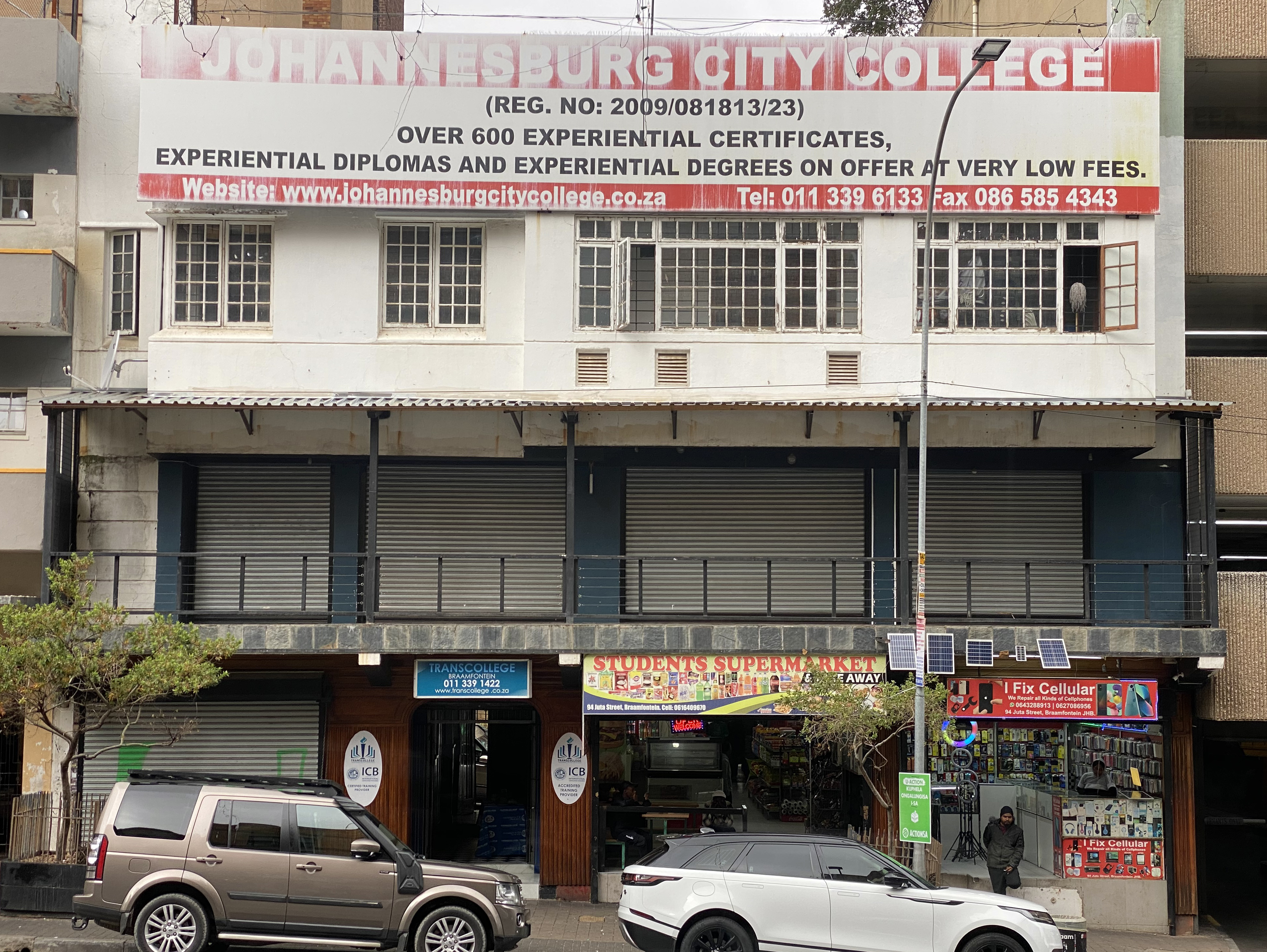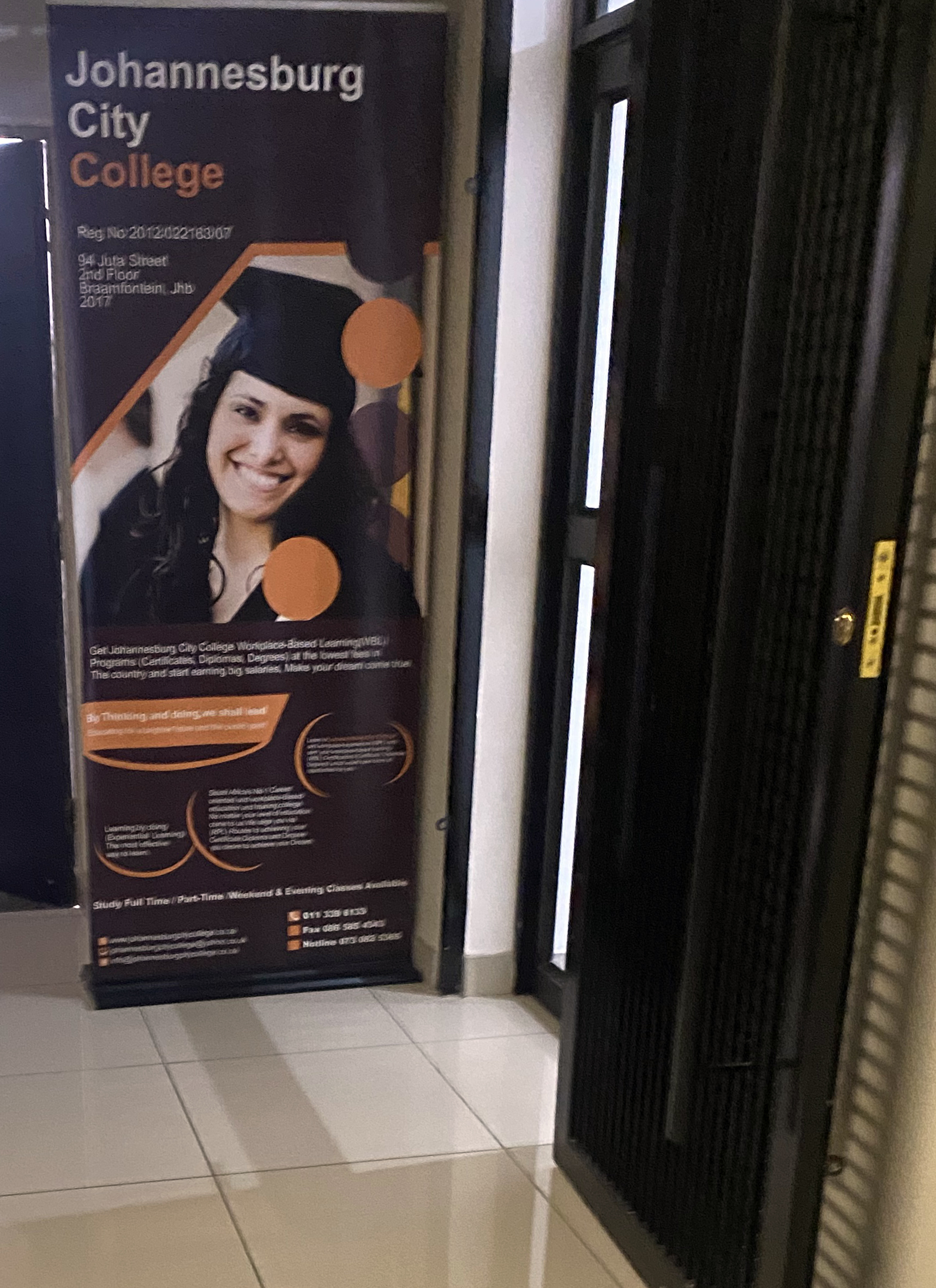DODGY COLLEGES
Authorities warn against ‘bogus’ Johannesburg City College and fake qualifications

Authorities attempted to close down the ‘bogus’ Johannesburg City College but it continues to lure students. Higher education bodies have warned prospective students to do their research before signing up to study.
Johannesburg City College continues to operate despite authorities warning that it is a “bogus” college.
The college is tucked away on the 10th floor of 69 Jorissen Street, Braamfontein.
Along the busy street, other colleges display their signage. But the Daily Maverick team could not find any signage belonging to Johannesburg City College, despite its website indicating its address, with no reference that it is on the 10th floor.
It’s not easy to find. Only its dilapidated, big yellow signage exists on 94 Juta Street, also in Braamfontein, where the college was based before it relocated late last year. That building is currently occupied by Transcollege.

A sign on the building that used to be the Johannesburg City College in Braamfontein. (Photo:Felix Dlangamandla)
What we found
After a number of enquiries, Daily Maverick finally managed to find Johannesburg City College on Friday, 12 April.
At its current building, only a banner was displayed next to the entrance door. There was nothing at the main entrance of 69 Jorissen Street to show that the college was there.
Inside, was a passage lined with a few chairs leading to a small reception area. Adjacent on the left were what seemed to be classes taking place, but there were fewer than four people seated and there was no physical lecture taking place.
Only installed partitions divide rooms. At the reception, the team met college principal Mbigohr Mighty, who is cited as its director in the company records.
Mighty confirmed that the college is not registered with the Department of Higher Education, Science and Innovation.
He said the college is operating because it offers work-based learning, which he claimed did not require registration with the department.
The college claims on its website that it provides education based on the Recognition of Prior Learning (RPL).
Mighty was not forthcoming. He declined to answer questions, blaming previous media reports for misrepresentation. But, he indicated that there was ongoing litigation in relation to the college’s operations.
Higher Education, Science and Innovation Deputy Minister Buti Manamela visited the college in 2022, in the presence of police officers, and interacted with Mighty, who admitted that they were not registered with the department.
Manamela stated at the time that the college would be shut down in collaboration with police and the National Prosecuting Authority (NPA). Police confirmed to City Press at the time that a case had been opened.
“Ask yourself why we are operating,” Mighty said at the time.
He said he showed the college’s pamphlets to the authorities detailing what they offer before he was frogmarched by authorities out of the premises.
The NPA wanted case numbers to track the case, which could not be provided because such details had to be obtained from the higher education department.
When Daily Maverick sent questions about the ongoing operations of the college for this story, the Department of Higher Education, Science and Innovation did not respond despite repeated requests.

A banner at the entrance of the Johannesburg City College in Braamfontein. (Photo:Felix Dlangamandla)
Dodgy degrees, at a cost
According to a Johannesburg City College pamphlet, the college offers over 600 “non-credited work bearing” certificates, higher diplomas and degrees at “very low fees”, claiming to be “the lowest fees college” in South Africa.
It claims it offers distance and contact learning — part-time and full-time — including evening classes. The duration of certificates ranges between two weeks to a year, diplomas between a year to three, and degrees from three to four years.
A certificate and higher diplomas with a duration of one to two years costs about R10,50o while a degree costs R32,000.
The lowest two-week certificate costs R750, which is the same amount paid to register. An additional R500 or R750 — depending on the study level — is required for learning materials (books and/or CDs).
A practical fee or experiential learning fee is wanted for field trips including a graduation fee.
Bogus
Embedded on the Johannesburg City College website is a document attributed to its Quality Assurance Council, which claims that the college bases its “Education Provisioning on Lifelong Learning and Recognition of Prior Learning (RPL)”, which is recognised in the National Standards Bodies Regulation No 18787 of 28 March 1998 issued in terms of the South African Qualifications Authority (SAQA) Act 58 of 1995.
In part, the document states that the college is the “provider” of qualifications that will address a shortage of skills and knowledge.
But neither the college nor its Quality Assurance Council appears on the South African Qualifications Authority (Saqa) list of providers currently accredited to offer RPL-related qualifications.
Responding to Daily Maverick on 10 April 2024, Saqa indicated the college does not appear on its database.
Saqa stated that the college is listed as “bogus” in the register of the department.
“For me, the red flag is the email address (.yahoo.co.uk),” said a Saqa official, who cannot be named as she does not have the authority to speak to the media.
Continued efforts to lure students
Despite the government’s past intervention and Saqa classifying it as bogus, the college continues to advertise on its Facebook page.
In one of its Facebook posts, the college posted a message on 3 April 2024 which reads: “Get career ready with Johannesburg City College. Get industry aligned certificates, diplomas and degrees through research and real world projects. WhatsApp: 0730625365 to register.”
Someone who works at the college, who asked not to be named out of fear they’d lose their job, told Daily Maverick that a department official and Johannesburg Metro Police Department (JMPD) inspected the college in February 2024 — at the height of the student registration period.
The City of Johannesburg, which oversees the JMPD, did not respond to requests for comment at the time of writing.
The apparent inspection came at the same time that officials from Saqa, the Council on Higher Education (CHE), the Quality Council for Trades and Occupations, and Umalusi warned prospective students about the dangers of enrolling in institutions of higher education that offer qualifications that are either not registered or credited in a briefing held in Pretoria on 12 February.
Following that briefing, CHE chief executive officer Dr Whitfield Green told Daily Maverick that Johannesburg City College was among those found to be bogus.
Green explained that thorough investigations were conducted into the college’s operations after the CHE was alerted by students, parents and through social media whistleblowing.
CHE staff, he said, also regularly checked their websites to verify the accreditation claims that these institutions would make.
Other higher education institutions also reported their operations to the CHE. The CHE, Green said, also receives updates on such institutions from the higher education department.
He said the CHE communicates the status of an institution based on its records of accreditation.
‘False claims’
Green said the CHE receives information about suspect education institutions, such as an institution falsely claiming to be registered by the department; that their programmes are approved by the CHE; and that their qualifications are registered on the National Qualification Framework (NQF) – a legislated system governing classification, registration, publication and articulation of quality-assured national qualifications.
Saqa, an oversight body of the NQF, oversees the implementation of the NQF and collaborates with quality councils, registers qualifications and recognises professional bodies and registers professional designations.
Green said the CHE then investigated the allegations.
This, he said, involves contacting the institution to obtain information on the claims it has made and cross-checking records such as the CHE’s own accreditation records, the department’s register of private higher education institutions, and Saqa databases.
He said the department would be alerted when it has been “confirmed” that an institution is making false claims.
Recently, Green said the CHE has embarked on a process of releasing communiques to make the public aware of the status of institutions.
Green confirmed that Johannesburg City College programmes were not accredited by the CHE. He said the college submitted five qualifications for accreditation in 2012 and 2013.
These were Bachelor of Business Admin, Bachelor of Science, Bachelor of Arts, National Diploma in Arts and National Diploma in Science.
“The qualifications were not accredited,” Green said.
Other colleges to watch out for
According to the CHE, other institutions that were flagged included the SADC University Of African Medicine (SADC UAM), Immanuel University/Institute of Theology, St Paul Bible Institute and Covenant Fellowship Bible School (CFBS).
Green issued a statement on 19 July 2023 that said the SADC UAM is not accredited by the CHE to offer any higher education qualifications in South Africa.
“If any higher education qualifications have been awarded, these have been awarded illegally and have no standing,” the announcement read.
It continued: “They are fraudulent qualifications that are not recognised.”
Green stated in the announcement that Sadcuam cannot accredit or “franchise’’ any other institution to enable that institution to offer higher education qualifications in South Africa.
“The so-called accredited institution would also be operating illegally and offering fraudulent qualifications,” the announcement reads.
Despite the institution not being officially accredited, SADC UAM founder Professor Mbaimbai Hlati persisted in claiming that they are traditional practitioners and are registered.
He said they are not teaching anything connected with higher education and have applied for accreditation but the CHE does not have traditional practice as a subject.
“[W]hat we are doing is we empower Traditional Practitioners after they finish with Ukut[h]wasa [undergoing traditional healer initiation process],” Hlati said.
He said they have communicated with CHE and were trying to make the council understand their position.
Their courses include plant identification, cultivation methods, harvesting techniques, pharmacognosy, herbal formation and therapeutic uses. The institution offers hands-on training opportunities such as practical experience in herbal medicine preparations.
“An examination of this institution’s website, the partnerships that are claimed to be in place, and the ‘qualifications’ it seeks to admit students into are all clearly associated with higher education,” said Green.
He said a snapshot from the website at the time the CHE issued the communique clearly shows how the institution was claiming to be accredited by the CHE.
Meanwhile, Daily Maverick approached Immanuel University/Institute of Theology for comment but a response had not been received at the time of writing.
Other institutions could not be tracked online, eiter in the registry of companies or on social media.
How to check if an institution is bogus
People and companies can check the authenticity of qualifications and registration of private institutions of higher learning through the following steps:
- Check if private further education and training colleges and private higher education institutions are accredited, by checking on the CHE and Department of Higher Education websites.
- Verify if Umalusi has registered the qualification. Contact [email protected] or phone 012 349 1510.
- Check the authenticity of a certificate with Saqa by visiting its website.
- To find out if a certificate for an occupational programme (e.g. learnerships) and related skills programmes is registered by the Quality Council for Trades and Occupations, visit its website. DM



















Comments - Please login in order to comment.